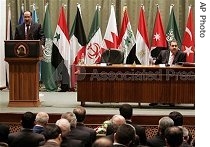-
(单词翻译:双击或拖选)
Baghdad
11 March 2007
At a regional security conference in Baghdad, Iraqi leaders focused on the positive role Iraq's neighbors can play in improving security, but they also warned the country must not be used as a battleground for international conflicts. VOA's Barry Newhouse reports from the Iraqi capital, representatives from the United States and Iran talked with each other during the meeting about security in Iraq.
 |
| The Iraqi Prime Minister Nouri al-Maliki, left, addresses the Baghdad peace conference, while the country's Foreign Minister Hoshyar Zebari looks on |
The conference focused on what delegates said were common goals of ending violence, supporting the Iraqi government and trying to improve the lives of Iraq's citizens. Representatives agreed to form three committees that would address Iraq's security, the needs of Iraqis fleeing violence and the country's desperate need for fuel.
But Prime Minister Nouri al-Maliki also told delegates that Iraq would not tolerate foreign nations trying to exert influence in Iraq by backing certain groups. Mr. Maliki said Iraq is changing from a totalitarian to a democratic state, and will not allow its streets to be used as an arena1 for international disputes. He also said Iraq does not allow its territory to be used to launch attacks against other nations, and he expects other nations to have the same policy.
As the delegates met in closed-door meetings inside the tightly-guarded Foreign Ministry2, a reminder3 of Baghdad's perilous4 security situation came when a mortar5 round struck near the building, sending people outside running for cover. Elsewhere in Baghdad, officials said, at least 18 people were killed and scores of others wounded when two suicide bombers6 detonated their explosives in the predominantly Shi'ite district of Sadr City.
Iraqi Foreign Minister Hoshyar Zebari urged delegates to recognize that improving Iraq's security is in the long-term interest of all nations. "It is in nobody's interest to see Iraq fail, because there would be a spillover. Your interests would be affected7, and you should look beyond any short-term self interest to long-term strategic interests to see a viable8, a stable recovered Iraq," he said.
U.S. and Iraqi officials have accused Iran and Syria of not doing enough to secure their borders to stop the flow of weapons and fighters that fuel the insurgency9.
The United States has also accused Iran of directly supporting militia10 fighters by suppling11 them with explosive projectile12 weapons that are capable of piercing thick armor. In the past, the United States has opposed discussing those issues directly with Iran.
But U.S. Ambassador to Iraq Zalmay Khalilzad said American delegates on Saturday spoke13 about the weapons concerns with their Iranian counterparts. "I did talk with them directly, and in the presence of others. We engaged across the table, as well. I did raise those concerns," he said.
The ambassador also said Iranian representatives voiced support for improving security in Iraq, but he said statements alone are not enough. "They have stated today that they support Iraq, that they support the reconciliation14 effort, that they support the effort to bring security to the people of Iraq. The next step is to see that these good sentiments, good statements be translated into concrete action," he said.
The head of Iran's delegation15, Abas Arakchi, said security in Iraq is necessary for stability in the region, so there is no reason for Iran to interfere16 in Iraqi politics, other than to support peace. He blamed Iraq's violence on the presence of foreign forces in the country. "The presence of foreign forces in Iraq justifies17 violence in that country, or serves the benefit of terrorists and violence in Iraq. And, violence is used to justify18 the presence of foreign forces. So, for the sake of peace and stability in Iraq, and to keep its integrity and unity19, we need a timetable for the withdrawal20 of the foreign forces," he said.
Delegates from all of the attending countries did agree to attend a future meeting on Iraq's security. The date and location have not been decided21, although Egypt and Turkey have offered to host.
 收听单词发音
收听单词发音
1
arena

|
|
| n.竞技场,运动场所;竞争场所,舞台 | |
参考例句: |
|
|
|
2
ministry

|
|
| n.(政府的)部;牧师 | |
参考例句: |
|
|
|
3
reminder

|
|
| n.提醒物,纪念品;暗示,提示 | |
参考例句: |
|
|
|
4
perilous

|
|
| adj.危险的,冒险的 | |
参考例句: |
|
|
|
5
mortar

|
|
| n.灰浆,灰泥;迫击炮;v.把…用灰浆涂接合 | |
参考例句: |
|
|
|
6
bombers

|
|
| n.轰炸机( bomber的名词复数 );投弹手;安非他明胶囊;大麻叶香烟 | |
参考例句: |
|
|
|
7
affected

|
|
| adj.不自然的,假装的 | |
参考例句: |
|
|
|
8
viable

|
|
| adj.可行的,切实可行的,能活下去的 | |
参考例句: |
|
|
|
9
insurgency

|
|
| n.起义;暴动;叛变 | |
参考例句: |
|
|
|
10
militia

|
|
| n.民兵,民兵组织 | |
参考例句: |
|
|
|
11
suppling

|
|
| 使柔软,使柔顺(supple的现在分词形式) | |
参考例句: |
|
|
|
12
projectile

|
|
| n.投射物,发射体;adj.向前开进的;推进的;抛掷的 | |
参考例句: |
|
|
|
13
spoke

|
|
| n.(车轮的)辐条;轮辐;破坏某人的计划;阻挠某人的行动 v.讲,谈(speak的过去式);说;演说;从某种观点来说 | |
参考例句: |
|
|
|
14
reconciliation

|
|
| n.和解,和谐,一致 | |
参考例句: |
|
|
|
15
delegation

|
|
| n.代表团;派遣 | |
参考例句: |
|
|
|
16
interfere

|
|
| v.(in)干涉,干预;(with)妨碍,打扰 | |
参考例句: |
|
|
|
17
justifies

|
|
| 证明…有理( justify的第三人称单数 ); 为…辩护; 对…作出解释; 为…辩解(或辩护) | |
参考例句: |
|
|
|
18
justify

|
|
| vt.证明…正当(或有理),为…辩护 | |
参考例句: |
|
|
|
19
unity

|
|
| n.团结,联合,统一;和睦,协调 | |
参考例句: |
|
|
|
20
withdrawal

|
|
| n.取回,提款;撤退,撤军;收回,撤销 | |
参考例句: |
|
|
|
21
decided

|
|
| adj.决定了的,坚决的;明显的,明确的 | |
参考例句: |
|
|
|















